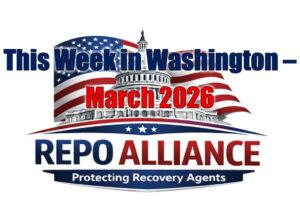EDITORIAL – RSIG Editorial – Vehicle Data Responsibility, A Can of Worms
Vehicle data responsibility – who is or isn’t responsible for the debtor’s personal nonpublic information in a repossessed vehicle is becoming a hot topic lately. Rumor has it that at least one national trade association has approved an app to clear this data, pushing the state associations to make it the duty of every recovery agency in their respective states to do so and their approved app to be the tool. It sounds like money to be made somewhere; it just doesn’t mean you will be the one making that money. It does not make sense why any recovery agent knowingly wants to open this can of worms.
I searched, but until recently, I was unable to find anywhere the placing of responsibility on the recovery agency’s doorstep to clear the debtor’s personal information from a repossessed vehicle. Nope, not the FCC, FTC, UDDAP, or even the good old CFPB has it as a recovery agent’s responsibility. That was not until Illinois, pushed by their state recovery association, recently passed legislation making it so.
What seems to be missing here is any forethought being given to the fact that this idea will be saddling every recovery agent with more liability, which, as we all know, they don’t need. This additional liability has not been previously considered by the debtor’s lawyers, who will salivate at the mouth on this one. Nor have the actuaries at the few participating insurance companies in this industry had reason to calculate it into their rating system.
After all, before the Illinois legislature made the recovery agent responsible, a recovery agent most likely would never have been in the picture. You had no control of the final disposition of the vehicle, no ownership of the car; at best, you are merely a temporary transporter or holder of the vehicle.
On most occasions, you don’t possess the vehicle’s key or the magical software needed to remove all that valuable data, so there is nothing to make you responsible. On the other hand, the lender has control, ownership, and most of the time access to the key, making them the most likely responsible party.
Now I read that the state associations are moving to make recovery agents wholly accountable for all that nasty personal information in their state.
Let’s examine the pros and cons:
Pro’s for the recovery agents
- Ummm, sorry, I can’t think of one. If you can convince a client to let you bill for something, that then becomes your sole obligation, not theirs. We all know how that works! I have spoken about vehicle data privacy with several large lenders and forwarders who implied they would look at this the same as your electric, telephone, and insurance bills: just one of your business costs. One chuckled as he said they would no longer have reason to pay for keys since the recovery agent would be legally mandated to make them one. He may have been joking because he thanked them for taking this gorilla off their backs.
Making it the lender’s responsibility would make more sense; they would need you to perform these services. That way, you could probably charge a fee or two.
CONS for recovery agents
- LIABILITY – that’s a big one; I assume you have enough worries about litigious debtors and their lawyers. Will your insurance carrier cover the claim when it happens? The big question there, and if they do, will your premiums go up or better yet will you be non-renewed or will yet another carrier get out of the market because they didn’t understand the business? Remember that your insurance company has not even looked at this new exposure. I don’t have a crystal ball, but experience tells me you have premium increases, possibly large ones, in the future. And then we have those pesky loss runs to worry about.
- COST – According to the information I saw, you must use an app approved by the American Recovery Association to provide you with a Certification of Completion for each vehicle where you delete the information. At a cost, of course, since you must use their approved app. Most manufacturers have included a function to delete private personal information in the later model vehicles; however, how will you get the mandated Certificate of Completion if you use the free manufacturer’s method? I am sure those connected with the software app will provide those Certificates free of charge – won’t they?
- HIRING – additional employees to handle the deletions or pay overtime for employees already on staff. What happens when an employee gets busy and releases vehicle(s), failing to use the app to remove the information? How about that angry, disgruntled employee who fails to delete any data?
Ultimately, as a repossessor it should come down to is this going to benefit/serve you or be a detriment to you increasing your liability and your costs? If it does increase your liability and your costs, do you see a way forward of protecting yourself and not having those increased costs even further shrink your bottom line? If the answer to those questions are No – then why would you or the state or national trade group who is supposed to be advocating for you support or push this forward?












More Stories
Colorado Bill Aims to Severely Impact All Repossession Operations
Today is Fallen Agents Day – 2026
From Auction Cutting to Field Programming: The Structural Shift No One Budgeted For
Bad Apples in the Repossession Industry
Why Self-Help Repossession Is Taken for Granted — and Why Losing It Would Hurt Consumers Most
A Necessary Distinction: Financial Oversight vs. Financial Control